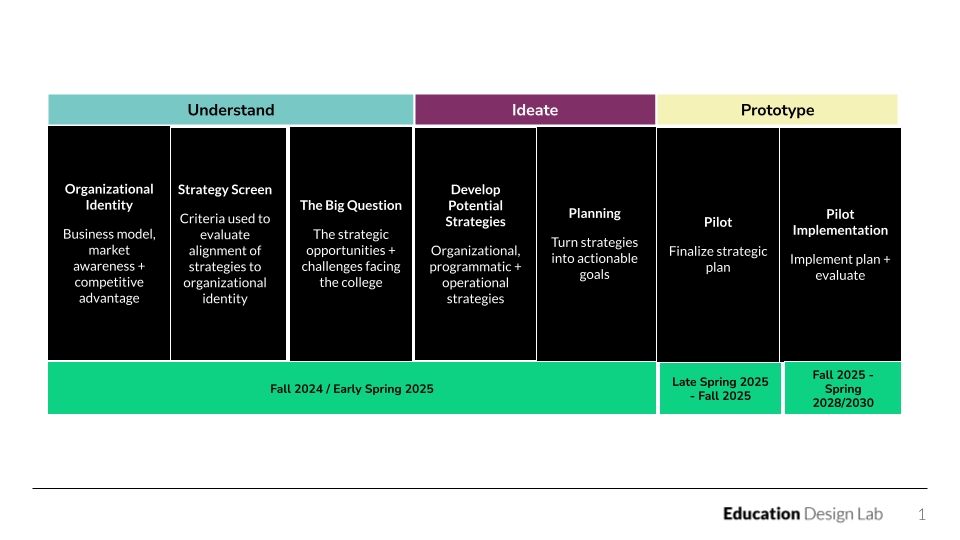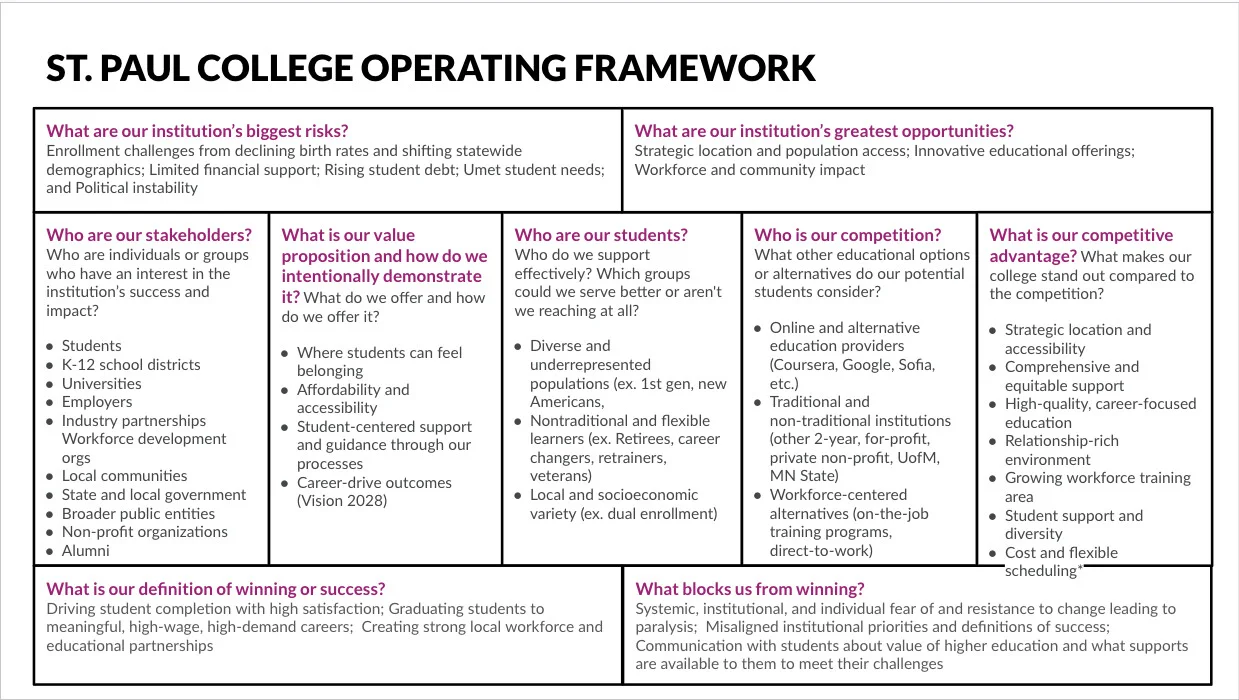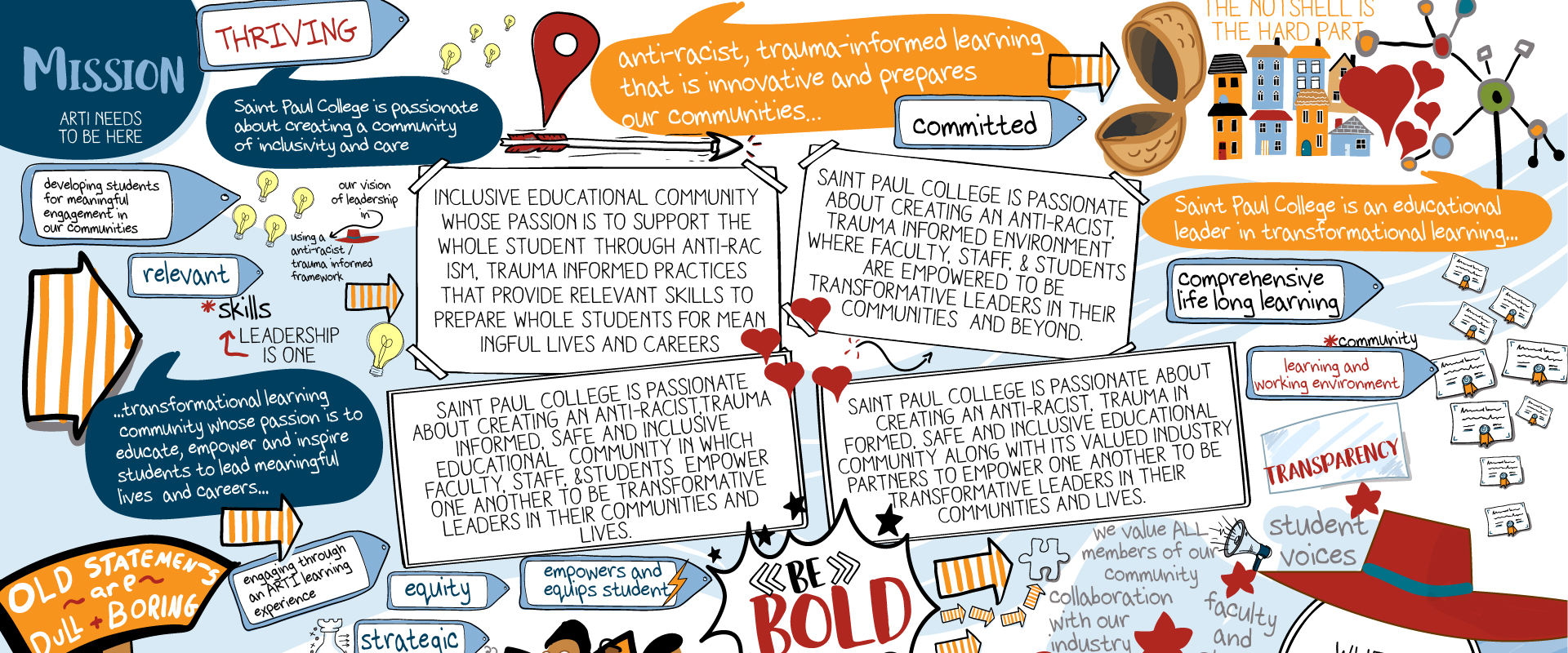Strategic planning drives our vision, linking ambition with action. We build a vibrant community by seizing opportunities and preparing for challenges.
Current plan
Saint Paul College has launched Our Promise Plan, a strategic framework built around Purpose, People, and Place. Building on the success of Creating a Stronger Future 2025, this plan reimagines the role of a community college in today’s world. Informed by campus-wide collaboration and our work with Education Design Lab, it reflects the voices of students, employees, and partners. This plan will guide our work until 2030.
Connecting the dots
Our mission, vision, and values fuel the strategies we develop. These strategies allow us to relentlessly pursue our goals and uphold our commitment to racial equity, vibrant communities, and thriving economies.
Annual planning
Budget planning
Past strategic plan
Creating a Stronger Future 2025 (CSF2025) was a three-year plan that leverages our century-long dedication to delivering quality education to our community. This plan ended in Summer 2025 as we began launching our work with Education Design Lab.
Our Promise Plan
Our Promise Plan is a strategic guide centered on Purpose, People, and Place—outlining how Saint Paul College grows, adapts, and continues placing student success at the heart of everything we do. In a time of transformation in higher education, this framework helps us stay responsive, inclusive, and future-focused.
THREE PROMISES, five GOALS
Purpose
By 2030, redesign the student experience to ensure all learners can identify and communicate the skills they gain—while navigating personalized, stackable learning pathways that connect their education to purpose, opportunity, and meaningful careers through coursework, co-curriculars, and applied learning.
People
Cultivate a bold and inclusive college culture where innovation thrives, challenges fuel learning, and every employee is empowered to proactively advance student success and enrich campus interactions for all.
Cultivate a bold and inclusive college culture that prepares every student to shape their own success—fostering courageous thinking, embracing setbacks as learning opportunities, and embedding equity, belonging, and innovation into every aspect of the student success pathway
Place
Demonstrate the role Saint Paul College plays in advancing equity and upward mobility through relevant, visible, and community-centered change.
Mitigate the impact of unmet basic needs through advocacy, education, and resource navigation.
what's next
Your feedback will help shape how these promises take root.
Over the next several weeks, you’ll see opportunities to engage with the draft framework—through surveys, action step-setting workshops, town halls, and department conversations. Your feedback will help shape how these promises take root. We welcome your reflections on how the framework resonates with you. What might make it clearer, more relevant, or more actionable—while staying true to its core intent.
The survey will launch in late August.

What to Expect
Over the next five years, we’ll be deeply engaged in a process of innovation and redesign. We’ll be working together to build a Saint Paul College that is even more responsive to the needs of our students and community, while strengthening our ability to adapt to the evolving demands of the workforce.

Who’s Involved
This is a collaborative effort involving not only our internal community but also external partners. We’ll be working closely with Education Design Lab, whose expertise in human-centered design and community college innovation will be invaluable. We’ll also be collaborating with other community colleges across the nation, sharing best practices and learning from each other’s experiences.

Why It Matters
This initiative will help Saint Paul College enhance student success by creating clearer pathways and providing relevant learning experiences. It will also strengthen our community by ensuring the college remains a vital resource for students and employers. By participating in this national initiative, we will be at the forefront of innovation in community college education.
Our Timeline

This timeline provides a roadmap for the Reimagining Community Colleges Design Challenge, guiding stakeholders through a structured process to create a new strategic plan that will drive sustainable and equitable solutions for Saint Paul College.
Operating Framework

Our Operating Framework allows us to assess our institution’s risks, opportunities, stakeholders, definitions of success, barriers to achieving that success, and more.
How might Saint Paul College deepen its community impact in Saint Paul as a trusted anchor college by supporting and empowering students to become engaged community members with the skills needed to provide lifelong economic stability?
Saint Paul College
Previous Strategic Plan
Creating a Stronger Future 2025
Launched in September 2022 after a year-long collaborative effort involving various stakeholders, Creating a Stronger Future 2025 (CSF2025) is a three-year plan that leverages our century-long dedication to delivering quality education to our community. Positioned to adapt to the dynamic demands of today’s workforce, this strategic plan is imbued with our commitment to anti-racism and trauma-informed practices. CSF2025 outlines four strategic directions to chart the College’s course to 2025.

Annual Planning

Annual Planning enables each department to set objectives, outline actionable tasks, and demonstrate how they support College goals. It justifies budget requests and aligns allocations with strategic priorities.
Budget Planning
The annual operating budget at Saint Paul College is a monetary plan aligned with Board policies and system procedures. The Finance Department aims to support the College’s mission through a budget process that secures long-term financial health.
The College will make planning, budgeting, and decisions based on a commitment to the College’s budget planning principles:
Principle 1: The annual budget is informed by the annual priorities established by the College. For the budget process to be strategic, decisions related to resource allocation must be grounded in the annual planning process and support the identified college priorities.
Principle 2: Budget development utilizes and prioritizes decision made from a data-informed process. The budget must be balanced. The planning of the annual budget must be done in a way that anticipated expenditures do not exceed anticipated revenue. Annual evaluation of spending patterns including a critical review of past spending decisions and the impact on strategic priorities is considered.
Principle 3: All final budget decisions are based on a fair and equitable evaluation of both cost and strategic prioritization. Once budgets are approved, departments are expected to operate within the annual budget, unless unforeseen circumstances arise (e.g., state appropriations reductions, enrollment changes, unfunded mandates etc.) occur during the year. If costs arise that were unplanned and/or unexpected, departments are expected to evaluate how the costs could be absorbed with current, available resources prior to requesting additional funds.
Principle 4: Maintain transparent, timely, factual, and honest communication throughout the college community. The College will provide timely information and updates about the budget and planning process including Shared Governance Committees, college-wide town hall discussions and department/division feedback.
Principle 5: Focus on long-term strategic outcomes. Budget and planning requires a multi-year perspective on attaining strategic objectives, priorities and goals.
Principle 6: Minimize the impact cost to students whenever possible. The budget is planned to limit the additional costs to students that may occur due to new initiatives and services/programs. Use of one-time funds to off-set these expenses are made whenever possible.
Please see the following budget resources for more information:
- Minnesota State Colleges and Universities Finance Division
- Minnesota State Colleges and Universities Budget
If you have questions or comments about the Saint Paul College Budget process, please send an email to Scott Wilson.